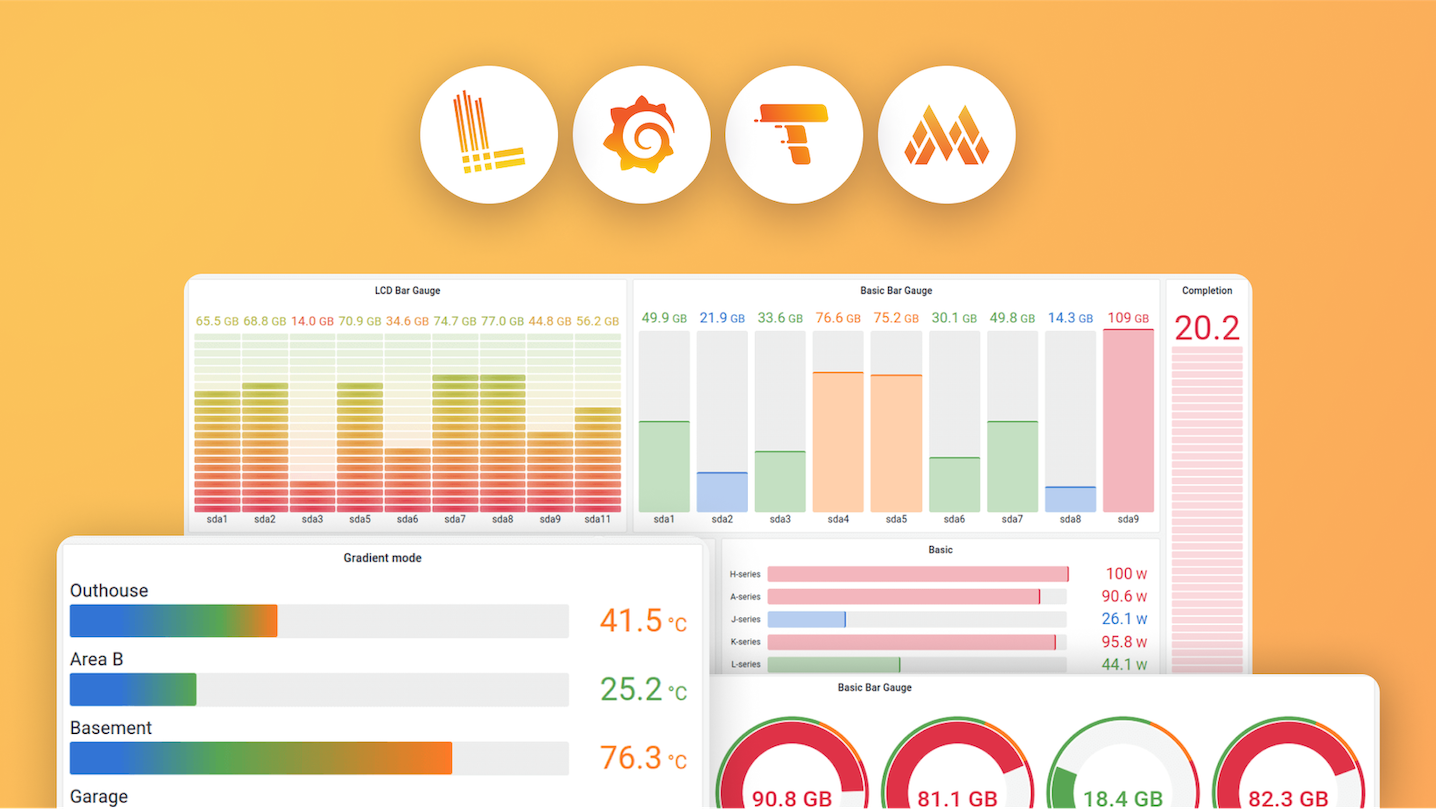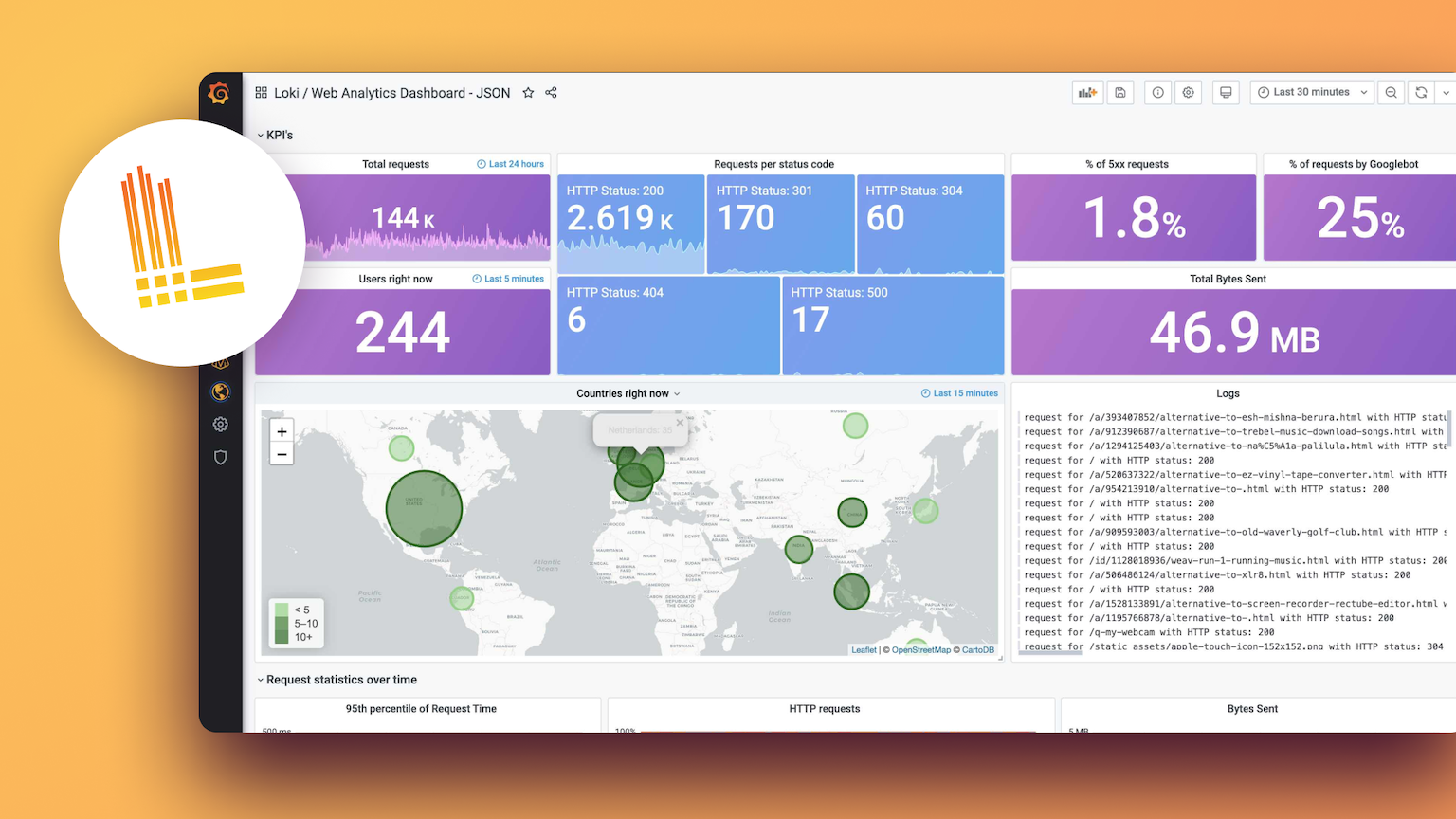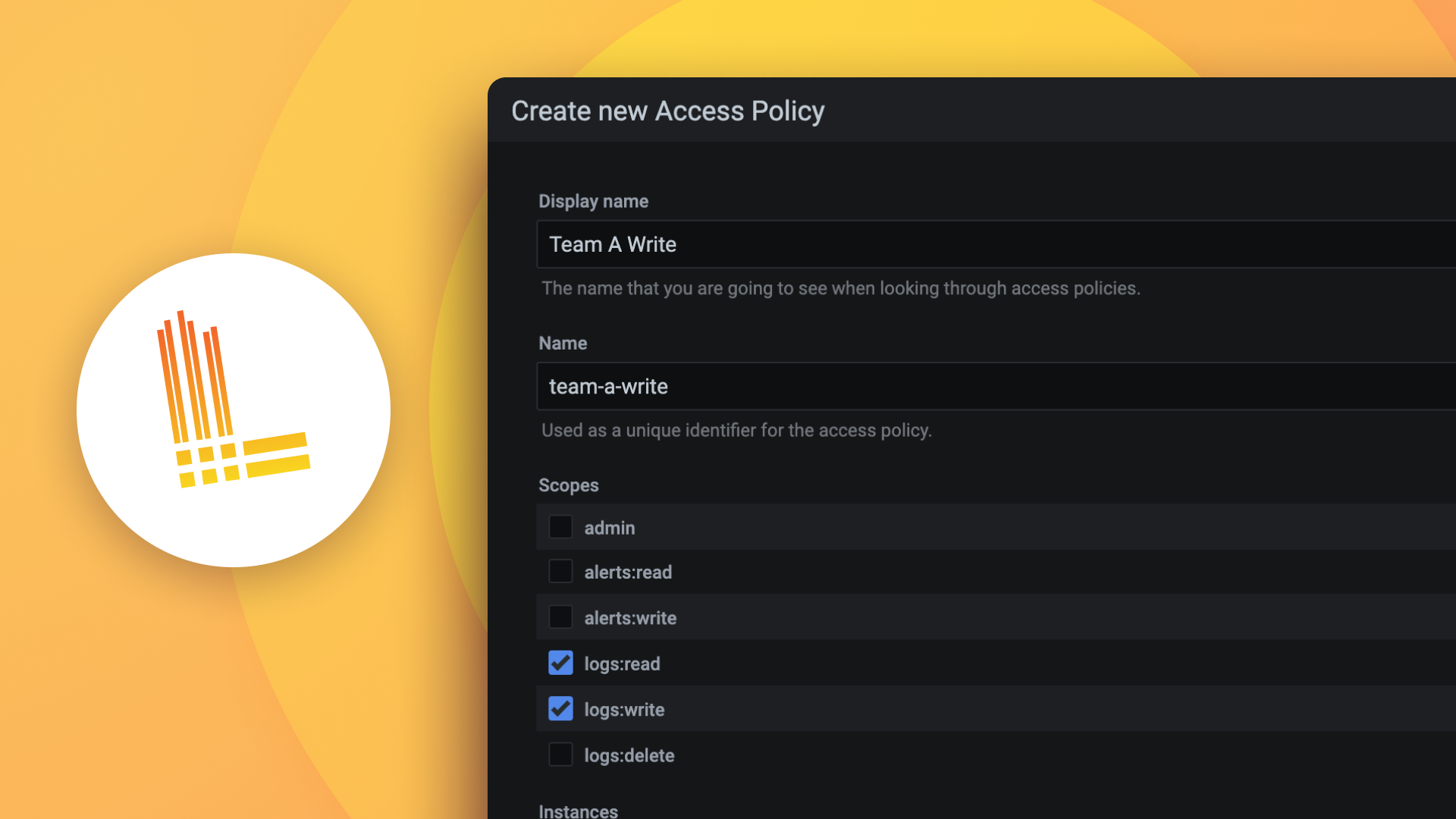Plugins 〉Oracle Database
Oracle Database
How to configure the Oracle Database plugin
Instantly visualize Oracle data in Grafana
The Oracle data source plugin is the easiest way to pull Oracle data directly into Grafana dashboards.
- Visualize it either in isolation (one database) or blend it with other data sources.
- Discover correlations and covariances across all your data in minutes.
Grafana Cloud Free
- Free tier: Limited to 3 users
- Paid plans: $55 / user / month above included usage
- Access to all Enterprise Plugins
- Fully managed service (not available to self-manage)
Self-hosted Grafana Enterprise
- Access to all Enterprise plugins
- All Grafana Enterprise features
- Self-manage on your own infrastructure
Grafana Cloud Free
- Free tier: Limited to 3 users
- Paid plans: $55 / user / month above included usage
- Access to all Enterprise Plugins
- Fully managed service (not available to self-manage)
Self-hosted Grafana Enterprise
- Access to all Enterprise plugins
- All Grafana Enterprise features
- Self-manage on your own infrastructure
Grafana Cloud Free
- Free tier: Limited to 3 users
- Paid plans: $55 / user / month above included usage
- Access to all Enterprise Plugins
- Fully managed service (not available to self-manage)
Self-hosted Grafana Enterprise
- Access to all Enterprise plugins
- All Grafana Enterprise features
- Self-manage on your own infrastructure
Grafana Cloud Free
- Free tier: Limited to 3 users
- Paid plans: $55 / user / month above included usage
- Access to all Enterprise Plugins
- Fully managed service (not available to self-manage)
Self-hosted Grafana Enterprise
- Access to all Enterprise plugins
- All Grafana Enterprise features
- Self-manage on your own infrastructure
Grafana Cloud Free
- Free tier: Limited to 3 users
- Paid plans: $55 / user / month above included usage
- Access to all Enterprise Plugins
- Fully managed service (not available to self-manage)
Self-hosted Grafana Enterprise
- Access to all Enterprise plugins
- All Grafana Enterprise features
- Self-manage on your own infrastructure
Installing Oracle Database on Grafana Cloud:
Installing plugins on a Grafana Cloud instance is a one-click install; same with updates. Cool, right?
Note that it could take up to 1 minute to see the plugin show up in your Grafana.
Warning
Plugin installation from this page will be removed in February 2026. Use the Plugin Catalog in your Grafana instance instead. Refer to Install a plugin in the Grafana documentation for more information.
Installing plugins on a Grafana Cloud instance is a one-click install; same with updates. Cool, right?
Note that it could take up to 1 minute to see the plugin show up in your Grafana.
Warning
Plugin installation from this page will be removed in February 2026. Use the Plugin Catalog in your Grafana instance instead. Refer to Install a plugin in the Grafana documentation for more information.
Installing plugins on a Grafana Cloud instance is a one-click install; same with updates. Cool, right?
Note that it could take up to 1 minute to see the plugin show up in your Grafana.
Warning
Plugin installation from this page will be removed in February 2026. Use the Plugin Catalog in your Grafana instance instead. Refer to Install a plugin in the Grafana documentation for more information.
Installing plugins on a Grafana Cloud instance is a one-click install; same with updates. Cool, right?
Note that it could take up to 1 minute to see the plugin show up in your Grafana.
Warning
Plugin installation from this page will be removed in February 2026. Use the Plugin Catalog in your Grafana instance instead. Refer to Install a plugin in the Grafana documentation for more information.
Installing plugins on a Grafana Cloud instance is a one-click install; same with updates. Cool, right?
Note that it could take up to 1 minute to see the plugin show up in your Grafana.
Warning
Plugin installation from this page will be removed in February 2026. Use the Plugin Catalog in your Grafana instance instead. Refer to Install a plugin in the Grafana documentation for more information.
Installing plugins on a Grafana Cloud instance is a one-click install; same with updates. Cool, right?
Note that it could take up to 1 minute to see the plugin show up in your Grafana.
Installing plugins on a Grafana Cloud instance is a one-click install; same with updates. Cool, right?
Note that it could take up to 1 minute to see the plugin show up in your Grafana.
Warning
Plugin installation from this page will be removed in February 2026. Use the Plugin Catalog in your Grafana instance instead. Refer to Install a plugin in the Grafana documentation for more information.
Installing plugins on a Grafana Cloud instance is a one-click install; same with updates. Cool, right?
Note that it could take up to 1 minute to see the plugin show up in your Grafana.
For more information, visit the docs on plugin installation.
Installing on a local Grafana:
For local instances, plugins are installed and updated via a simple CLI command. Plugins are not updated automatically, however you will be notified when updates are available right within your Grafana.
1. Install the Data Source
Use the grafana-cli tool to install Oracle Database from the commandline:
grafana-cli plugins install The plugin will be installed into your grafana plugins directory; the default is /var/lib/grafana/plugins. More information on the cli tool.
Alternatively, you can manually download the .zip file for your architecture below and unpack it into your grafana plugins directory.
Alternatively, you can manually download the .zip file and unpack it into your grafana plugins directory.
2. Configure the Data Source
Accessed from the Grafana main menu, newly installed data sources can be added immediately within the Data Sources section.
Next, click the Add data source button in the upper right. The data source will be available for selection in the Type select box.
To see a list of installed data sources, click the Plugins item in the main menu. Both core data sources and installed data sources will appear.
Changelog
v3.3.2 - 2026-01-19
- 🐛 Fix: Improve support for TNSNames entry
v3.3.1 - 2025-12-03
- ⚙️ Chore: Update frontend dependencies
- ⚙️ Chore: Minimal supported Grafana version is now
11.6.7
v3.3.0 - 2025-10-15
- 🐛 Fix: Restore support for TNSNames entry
v3.2.0 - 2025-10-09
- 🐛 Fix: Improve compatibility with Oracle 19c
v3.1.0 - 2025-10-09
- 🚀 Feature: Support Prefetching Row
v3.0.0-beta.6 - 2025-08-26
- ⚙️ Chore: Improve logging
v3.0.0-beta.5 - 2025-08-26
- ⚙️ Chore: Improve logging
v3.0.0-beta.4 - 2025-08-18
- ⚙️ Chore: Improve logging
v3.0.0-beta.3 - 2025-08-01
- 🐛 Fix: Add timestamp casting to
$__timeGroupTZmacro
v3.0.0-beta.2 - 2025-07-28
- ⚙️ Chore: Update backend dependencies
v3.0.0-beta.1 - 2025-07-10
- 🚀 Feature: Change underlying sql driver to simplify deployment and builds
v2.13.0 - 2025-07-01
- 🐛 Fix: No longer error on empty result sets
v2.12.0 - 2025-05-13
- 🐛 Fix: Fix timeGroupTZ macro to handle timezone conversion correctly
v2.11.0 - 2025-04-15
- ⚙️ Chore: Simplify build and developer experience
v2.10.10 - 2025-04-02
- 🐛 Fix: Change lib owners in build
v2.10.9 - 2025-04-01
- ⚙️ Chore: Update backend dependencies
v2.10.8 - 2025-03-03
- ⚙️ Chore: Update backend dependencies
- ⚙️ Chore: Fix error source for frame processing errors
v2.10.7 - 2025-03-11
- ⚙️ Chore: Remove wrong error log line
v2.10.6 - 2025-02-17
- ⚙️ Chore: Improve error logging
v2.10.5 - 2025-02-04
- ⚙️ Chore: Update frontend dependencies
v2.10.4 - 2025-01-10
- ⚙️ Chore: Update backend dependencies
v2.10.3 - 2025-01-06
- ⚙️ Chore: update backend dependencies
v2.10.2 - 2024-12-30
- 🐛 Fix: Refactor database connector to avoid data races
- ⚙️ Chore: Update backend dependencies
v2.10.1 - 2024-12-18
- ⚙️ Chore: Update backend driver
v2.10.0 - 2024-12-18
- 🐛 Fix: Add timeout to health + query
v2.9.2 - 2024-12-18
- ⚙️ Chore: Update backend dependencies
v2.9.1- 2024-12-17
- ⚙️ Chore: Update backend dependencies
v2.9.0 - 2024-12-16
- 🚀 Feature: Move environment variables into config page
v2.8.13 - 2024-11-12
- ⚙️ Chore: Updated backend dependencies
v2.8.12 - 2024-10-03
- ⚙️ Chore: Update frontend dependencies
- ⚙️ Chore: Minimal supported Grafana version is now
10.4.8
v2.8.11 - 2024-09-23
- ⚙️ Chore: Update backend dependencies
v2.8.10 - 2024-08-30
- ⚙️ Chore: update backend dependencies
v2.8.9 - 2024-08-30
- ⚙️ Chore: add logging on timezone load failures
v2.8.8 - 2024-08-02
- 🐛 Fix: refactor db connections cache locking to prevent cases when it's always locked
v2.8.7 - 2024-07-22
- ⚙️ Chore: Add logging in case cached connection verification fails
v2.8.6 - 2024-07-19
- ⚙️ Chore: Update backend dependencies and add more debug logging
v2.8.5 - 2024-06-19
- ⚙️ Chore: update backend dependencies
v2.8.4 - 2024-06-13
- 🐛 Fix: Fix response format when no rows are returned
- ⚙️ Chore: Update backend dependencies
v2.8.3 - 2024-04-05
- 🐛 Fix: Fix broken PDC
v2.8.2 - 2024-03-18
- ⚙️ Chore: Backend binaries are now compiled with Go version
1.22.1
v2.8.1 - 2024-03-18
- ⚙️ Chore: Update backend dependencies
v2.8.0 - 2024-02-29
- ⚙️ Chore: add error source
v2.7.1 - 2023-11-16
- 📝 Documentation: Updates to Oracle data source documentation breaking it into topics
v2.7.0 - 2023-11-01
- ⚙️ Chore: Update backend and frontend dependencies
- ⚙️ Chore: Minimum required Grafana runtime version is now 9.5.13
v2.6.4 - 2023-09-07
- 🐛 Fix: Fix bug causing configuration page not working in some cases
v2.6.3 - 2023-08-25
- ⚙️ Chore: Remove "Generated SQL" button from the query editor as it duplicates the functionality of the query inspector
v2.6.2 - 2023-08-24
- ⚙️ Chore: add debug container
v2.6.1 - 2023-08-23
- ⚙️ Chore: e2e test support
v2.6.0 - 2023-06-09
- ⚙️ Chore: Configuration page UI and UX overhaul
v2.5.1 - 2023-06-08
- ⚙️ Chore: backend libs updated with golang:1.20.5
v2.5.0 - 2023-05-31
- 🚀 Feature: Secure socks proxy support added
v2.4.6 - 2023-05-23
- ⚙️ Chore: Fixes a bug with the QueryEditor onBlur event so it fires the correct onChange prop
v2.4.5 - 2023-05-05
- ⚙️ Chore: Updating Dockerfiles to use Go version
1.20.4which contains security fixes
v2.4.4 - 2023-05-03
- ⚙️ Chore: Backend binaries are now compiled with Go version
1.20.4which contains security fixes
v2.4.3 - 2023-04-19
- ⚙️ Chore: Backend binaries are now compiled with Go version
1.20.3which contains security fixes - ⚙️ Chore: Minimum required Grafana runtime version is now 8.4.7
v2.4.2 - 2023-04-19
- ⚙️ Chore: Backend dependencies updated
v2.4.1 - 2023-03-30
- ⚙️ Chore: Remove unused images in screenshots folder
v2.4.0 - 2023-03-28
- 🚀 Feature: Prevent from using kerberos when TNSNames option is disabled
- 🚀 Feature: Prevent from running query on editor blur
- 🐛 Fix: Fix Generated SQL in code Editor
- 📝 Documentation: Fix formatting and cleanup in docs
v2.3.0 - 2023-02-10
- 🚀 Feature: Data source config page improvements
v2.2.8 - 2022-12-15
- ⚙️ Chore: Backend dependencies updated
- ⚙️ Chore: Backend binaries are now compiled with Go 1.19.4
v2.2.7 - 2022-11-01
- backend binaries are compiled with go 1.19.3
v2.2.6 - 2022-10-14
- follow-up on obfuscate password input: replace input field with SecretInput from @grafana/ui
- update dependencies to v8.4.7
- update docs
v2.2.5 - 2022-10-14
- obfuscate password input in datasource setting
- update docs
v2.2.4 - 2022-10-05
- Update the feature for response data size
v2.2.3 - 2022-09-28
- Update docs
v2.2.2 - 2022-09-28
- User can define query response data size with environment variable
GF_PLUGINS_ORACLE_DATASOURCE_MAX_RESPONSE_SIZE - Update
DEV_GUIDE.mdfor ARM64 developers
v2.2.1 - 2022-09-06
- ⚙️ Chore: Add back the format selector in the query editor
v2.2.0 - 2022-07-22
- ⚙️ Chore: update linux amd64 oracle client to 21.6
v2.1.3 - 2022-06-09
- 🐛 Fix: set exec permissions
v2.1.2 - 2022-05-17
- Fix libs for rhel/centos 7.x
v2.1.1 - 2022-05-17
- Add libs for rhel/centos 7.x
v2.1.0 - 2022-05-05
- Reduce size of Linux zip
v2.0.9 - 2022-03-03
- Re-implement timezone translation
v2.0.8 - 2022-01-13
- Adds error message that warns user when response message size is larger than 16Mb
- Adds the option to compile back-end for ARM64 processors
v2.0.7 - 2022-01-10
- ⚙️ Chore: Update Licensing
v2.0.6 - 2021-08-10
- Adds documentation for RHEL 8 libnsl dependency
- Fixes an issue where hidden queries were still being executed
- Fixes an issue where queries with just whitespace (empty) were being executed.
v2.0.4 - 2021-04-12
- ⚙️ Chore: Update SDK
v2.0.2 - 2020-10-09
- Fixed signed plugin issue
v2.0.1 - 2020-10-06
- Fixed configuration editor to allow tnsname and kerberos options to be selected during manual setup
- Adjusted configuration editor entry field sizes
v2.0.2 - 2020-10-09
- Fixed signed plugin issue
v2.0.1 - 2020-10-06
- Fixed configuration editor to allow tnsname and kerberos options to be selected during manual setup
- Adjusted configuration editor entry field sizes
v2.0.0 - 2020-10-01
- Compatible with Grafana v7.1+
Key Features:
- Conversion to dataframes for easier use with different visualizations and data transformations
- Updated to use InstantClient v19, supporting stcp connections
- Query editor now uses monaco for syntax
Bugfixes:
- Connection cache will expire idle connections to prevent slow responses
Note: Time Zone support not included in v2.0.0, to be added in next minor release. All connections and results are processed as UTC.
v1.2.2 - 2020-08-28
- Fix for kerberos authentication error output
v1.2.1 - 2020-08-19
- NEW: Support for TNSNAMES and Kerberos Authentication
- Fix for issue #133 (redact message on connection error)
- Fix field comparisons for Annotation Queries
- Increase max message size to 16MB
v1.2.0 - 2020-05-15
- Now compatible with Grafana v7.0.0
- Now grafana-cli installable
v1.1.7 - 2020-03-27
- Fix for Edge Browser
v1.1.6 - 2020-03-25
- New fill options for macros (intervals now the same as other sql datasources)
- New timezone configuration setting for datasource (default is UTC)
- 🐛 Fix: removed auto-quoting of time columns in macros
v1.1.5 - 2020-02-13
- Better handling of macro
$__timeGroup - Implements fill options for
$__timeGroupsimilar to other sql datasources - Upgrade build to go-1.13.7
- Converted to go mod
- Additional test coverage
v1.1.4 - 2020-02-05
- Connection pool size is now working
- Profiling setting now working
- Fix for backend crash when nil values are return
- Fix for locking issue causing backend to hang
- Fix quoting issues
- Implement braces for macros
- Now allows sql statements inside macros
v1.1.3 - 2019-12-18
- GF_PLUGINS_ORACLE_DATASOURCE_POOLSIZE can be used to increase/decrease the size of the connection pool with Oracle. The new default is
50
v1.1.2 - 2019-11-04
- GF_PLUGINS_PROFILER must be set to "oracle-datasource" to enable profiling. default is false.
v1.1.1 - 2019-09-20
- Remove connection string output from debug mode
- Refactor to clean up go lint warnings
v1.1.0 - 2019-07-20
- Fixes panic of backend plugin on windows
- Update to all package dependencies
v1.0.9 - 2019-06-10
- Return message when query results are too large
- Prevent crash due to attempting too large response
- Additional handling of nullable columns
- Updated packages
v1.0.8 - 2019-05-15
- Now handles nullable column for value field when transforming to timeseries
v1.0.7 - 2019-05-09
- lower query cache TTL to 60 seconds
- fix leak due to deferred close inside loop
- reuse fingerprint vs recalculating (small performance gain)
- detect errors iterating rows
- add more debug output
- updated vendored packages
v1.0.6 - 2019-04-25
- Now provides info level log line when type is not matched
- Added additional data types
- converts to type FLOAT: SQLT_INT, SQLT_UIN, SQLT_FLT, SQLT_VNU, SQLT_LNG, SQLT_BFLOAT, SQLT_BDOUBLE
- converts to type STRING: SQLT_STR, SQLT_LVC, SQLT_VST, SQLT_VBI, SQLT_LBI, SQLT_LVB
- converts to type DATE: SQLT_DATE
- converts to type BYTES: SQLT_FILE
- 🐛 Fix: when a query returns no results (and data types as a part of the results), the types are not cached to allow future queries with results update the cache
v1.0.5 - 2019-04-08
- gRPC: hardcode message size to 16MB vs 4MB
- enable alerting
v1.0.4 - 2019-03-29
- Plugin now links oracle libraries from plugin directory, no need for installation externally on system (linux only, windows requires install)
v1.0.3 - 2019-03-18
- Support additional field type SQLT_NUME
- Better type conversions
- Add quoted time field to variable interpolation
v1.0.2 - 2019-03-04
- Update golang dependencies
v1.0.1 - 2019-02-05
Fixed
- High CPU utilization issue fix via short-term cache of column types
- Connection errors fixed by testing cached connections before returning to caller
v0.0.1 - 2018-05-09
Initial Release




